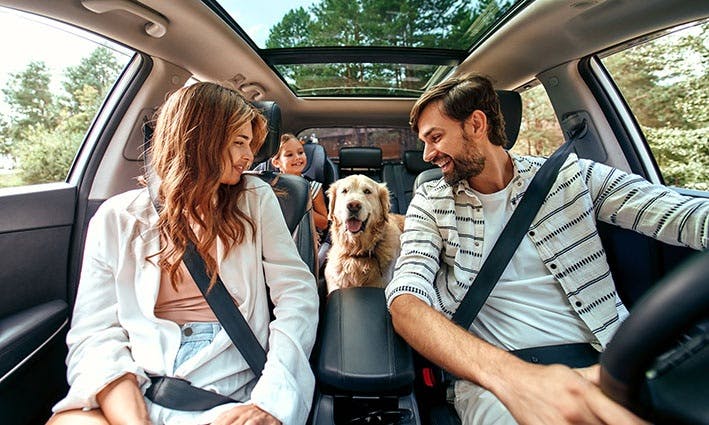Owning your own car is a great feeling, but the glow wears off quickly if it forces you to sacrifice the good things in life. So the first step is to calculate how much you can afford to repay and how much you can spend.
Add up all your monthly expenses, subtract that from your monthly income and whatever’s left – less a contingency for unforeseen costs – will be the amount you have available to potentially cover personal loan repayments.
Identify how much you can borrow
Our borrowing power calculator can provide you with an indication of how much you might be able to borrow. Factor in any spare funds you have to contribute, subtract an allowance for Motor Insurance and on-road costs or stamp duty and the calculator will show roughly how much you can afford to spend on the car.
Work out your vehicle requirements
To help focus your search, ask yourself:
- where you’ll be doing the bulk of your driving
- whether you’ll be parking in secure locations
- what conditions you’ll be driving in
- what balance you’re seeking between performance, efficiency, practicality and style
- what safety and other features are important to you.
Choose between new or used
Used cars are usually cheaper than new, but there are also many other factors to consider.
Benefits of buying new
New cars can offer peace of mind and are likely remain mechanically sound for many years after purchase. You will also find that later models will have better safety and fuel efficiency. But depreciation can also be an issue with new cars losing up to 40% of their value in the first few years of ownership.
Purchasing a new car, rather than used, generally ensures that:
- you know exactly what you’re getting, as there’s no potential for past misuse
- the vehicle has zero wear and tear, which should mean greater reliability
- you’re getting more modern technology, which generally means greater efficiency, comfort and safety
- it will meet your needs for a longer period of time (with proper care and maintenance)
- you get a warranty, or at least a longer one (although the length varies between makes and models)
- parts and accessories will be readily available.
Drawbacks of buying new
On the flipside, new cars:
- are more expensive than used – including insurance (generally speaking), servicing of electronics and complex componentry
- rapidly depreciate – your new car will be considered a used car as soon as you drive it home.
- When looking at buying used
Used cars will save you money on the purchase price but this may be eaten up in maintenance and fuel costs depending on the age of the technology in the vehicle you purchase. Plus the older the vehicle the less modern safety features you will likely get such as airbags and driver aids.
For many people the character and personality of older model cars can have enormous appeal, and there are certainly many examples out there that also offer fantastic performance, reliability, economy and safety.
But you do have to do your research. So at the very least, be sure to:
- check Glass’s Guide and Red Book for the vehicle’s market value
- have the car checked by a reliable mechanic – if it looks like a steal, it could be a lemon
- take a proper test drive and give it a good work-out, testing all features and instruments – even the spare tyre
- check the tyres, engine and body for damage and neglect
- check the Personal Property Securities Register to see if there’s any finance on the car.
Re-check your numbers
Once you’ve decided on a car, you need to re-check your numbers. Get a firm Motor Insurance quote, turn your estimate of on-road costs (for new cars) or stamp duty (for used cars) into a real number, and make sure that you have enough money to cover everything.
Comprehensive Motor Insurance is essential if the car will be offered as security for a loan, and well worth considering anyway.
Arrange formal loan approval
Car Loans come in a few simple variations – secured and unsecured, fixed and variable. Secured loans are almost always cheaper, while fixed-rate loans offer certainty and potentially lower rates.
When comparing lenders, make sure you consider all the costs. Dealer finance at a rock-bottom rate could end up costing you a lot more if the loan is weighed down with fees and hidden costs. Make sure you can repay your loan at any time without penalty. And you should be able to make extra repayments whenever you want, which will reduce the interest you pay. Redraw is also a handy feature.
This is general advice only and doesn’t take into account your objectives, financial situation or needs. Conditions, fees and lending criteria apply and are available on request.
Credit Union SA Ltd ABN 36 087 651 232, AFSL/Australian Credit Licence Number 241066 arranges this insurance as agent for the insurer Allianz Australia Insurance Limited ABN 15 000 122 850 AFSL No 234708. We do not provide any advice based on any consideration of your objectives, financial situation or needs. Policy terms, conditions, limits and exclusions apply. Before making a decision, please consider the relevant Product Disclosure Statement available from creditunionsa.com.au/terms-and-conditions. If you purchase this insurance, we will receive a commission that is a percentage of the premium. Ask us for more details before we provide you with services.
Join Credit Union SA
Join Credit Union SASay goodbye to big-profit banks and enjoy the benefits of being part of a credit union that helps you do more with your money.
We're here to help
Contact usCall us on 13 8777 or visit us at 400 King William Street, Adelaide

